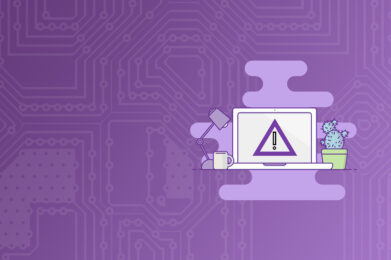
Scam Radar — March 2024
Below are three new scams to keep on your radar, as well as some tips for how to avoid them. Be on the look out for yourself, your family, and your clients! THINK BEFORE YOU CLICK!
Tax Attacks
Millions of people around the world are paying their taxes this time of year, and cybercriminals are hoping to get paid as well. In this recent scam, cybercriminals have been taking advantage of tax season by trying to trick you into opening an email and downloading a malicious PDF attachment. The email they send looks like a government form and includes a link to download the PDF attachment. The scammers even include helpful instructions for pasting the webpage URL into your browser in case the link isn’t working.
Clicking the link will redirect you to a fake webpage and initiate a file download. Malware is installed on your computer once the file downloads. Remember, cybercriminals don’t only want your money—they also want your data! They can use this malware to steal your user credentials and other personal data.
Tips to Avoid Similar Scams:
- The latest software versions for devices often contain security updates. Make sure that your devices are running the latest software updates recommended by your IT team.
- Follow your organization’s instructions for reporting any suspicious emails that you may receive. Quickly reporting suspicious emails can help keep your organization safe!
- Be skeptical of unsolicited emails from the government or other financial entities. Always double-check with the organization that sent the form if you have doubts about its authenticity.
Phony Utility Ads
Search engines, like Google, are so popular that many people use the search feature instead of typing a URL. For instance, people may quickly search for their electricity provider’s name to find the online payment portal. And for this scam, that’s exactly what cybercriminals want you to do. This scam tries to trick you into clicking on a fake ad instead of the billing portal that you’re trying to find. The scammers purchase a variety of fake utility payment advertisements, and you see those ads during your searches. They know that they can trick you more easily if you contact them instead of them reaching out to you.
If you click on one of these ads, you will be prompted to dial a phone number. Dialing the number puts you directly in contact with a scammer. They may try to scare you by saying that your bill must be paid immediately. Or they may tempt you with an offer to help you save money—but only if you act immediately. Neither the advertisement nor the person you are talking to is legitimate. Paying them won’t help with your utility bills, but the scammer might use you to help pay theirs!
Tips to Avoid Similar Scams:
- Remember, anyone can purchase an advertisement. Be cautious when clicking on ads, even if they seem relevant to you.
- Scammers often ask you to make payments using unusual methods, such as gift cards or money transfers. If something seems strange about a financial transaction, stop immediately!
- If an offer seems too good to be true, it probably is. Always stop and think before taking action!
Remote Desktop Robbery
Recently, cybercriminals have been trying to trick you into downloading software that they can use to access your computer. They start by sending you a fake email that appears to come from your bank. The email says that there is an issue with your account and that their team needs to investigate. Of course, there isn’t actually an issue, but the scammer offers to help you fix it.
Scammers often use fake emails to trick you into downloading malicious files. But in this scam, they have you download legitimate remote desktop software that is normally used by IT professionals to assist you. In this case, even though the software you download is legitimate, the person who is asking you to install it is a scammer. If you allow them to access your desktop, they have full control of your computer. Then they can request passwords or other login information from you to gain access to your financial accounts and data.
Tips to Avoid Similar Scams:
- Be suspicious of any unexpected emails claiming that there is an issue with your account. If you have reason to believe the request is genuine, contact your bank using a verified number or email address.
- Never give control of your computer to someone who contacts you, even if they claim to be from your bank or tech support.
- Never share passwords or login information with anyone. This data is personal, and your bank will never ask you for it.
For more information regarding scams, please visit the Federal Trade Commission (FTC) Consumer Advice website.
You can also find details about the signs of a scam, how to avoid a scam, and how to report a scam in this article by the FTC — How to Avoid a Scam.
All contracted Agents receive FREE access to SMS-University, the industry’s most trusted, comprehensive online training platform, featuring numerous training modules, white-papers, and clear, concise education tools.

Sources:
Cited in article.



